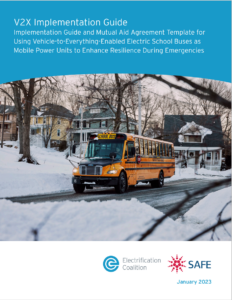The adoption of electric school buses (ESBs) is rising as school districts and fleet operators become aware of the significant benefits: clear air for student passengers, savings on bus fuel and maintenance costs, and reduced carbon emissions. ESBs are also gaining attention for their potential to enhance critical electric infrastructure resilience and reliability.
With vehicle-to-everything (V2X) technology, ESBs can serve as mobile power units, providing emergency backup power during disaster response. Given that underserved communities often are hit the hardest by extreme weather events, such as hurricanes, floods, tornadoes, and wildfires, ESBs as mobile power units could be particularly useful in enhancing resilience in these areas.
The SAFE-EC “V2X Implementation Guide and Mutual Aid Agreement Template for Using Vehicle-to-Everything-Enabled Electric School Buses as Mobile Power Units to Enhance Resilience During Emergencies” (guide) describes the potential to use V2X-enabled ESBs as alternative emergency backup power sources during outages. The guide includes detailed steps for emergency managers and responders and other key stakeholders, such as school districts, school facility managers, and electric utilities, to take before, during, and after an emergency to deploy bidirectionally enabled ESBs to provide emergency backup power. The guide recommends that V2X-enabled ESBs become recognized resources within the federal National Incident Management System and integrated into emergency plans in accordance with the Incident Command System. Such actions can expand interest in, and accelerate the deployment of, these technologies.
The guide also identifies potential federal funding opportunities that could facilitate the deployment of V2X–enabled ESBs for resilience purposes. Part II of the guide consists of a Mutual Aid Agreement (MAA) template with specific elements that are necessary to have in place and that merit agreement by relevant parties, so ESBs can be readily deployed during emergencies.
Utilizing ESBs to power critical facilities in emergencies will enhance infrastructure resilience, save lives, and strengthen our energy and national security.

